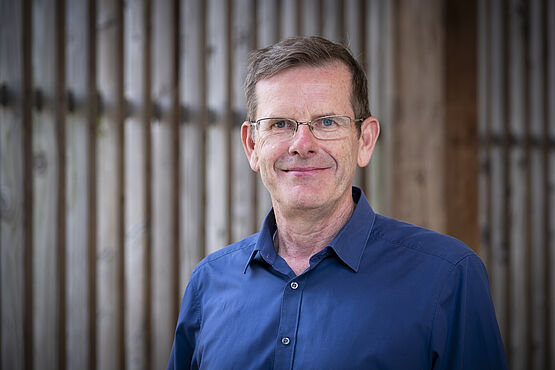Dr Ulrich Harmes-Liedtke
Dr. Ulrich Harmes-Liedtke is a process consultant and international expert in the field of international development cooperation. With more than 30 years of consulting experience, he is active in all phases of a project and program development (preparation, implementation, monitoring, and evaluation) and collaborates with various implementing organizations and development banks (German Development Cooperation - GIZ and PTB -, Inter-American Development Bank, European Union). He has consulting experience in Latin America and the Caribbean, in Africa, Asia, and Europe.
Dr. Harmes-Liedtke is an experienced facilitator and process consultant. He works with groups and teams to reflect on their situation and to then formulate change projects to improve their reality. He enables dialogue, facilitates and designs workshops, processes, and sense-making processes. He is certified in facilitation, mediation, and communication techniques which allow him to deal with sensitive, diverse, and even conflict situations.
He supports systemic economic development in various roles:
- As an expert and trainer in territorial upgrading, clusters, value chains, and quality infrastructure
- As a process consultant in designing and leading diagnostic processes that result in change, adaptation, and improvement
- As a facilitator of dialogue, workshops, training, and sense-making processes
- As a transdisciplinary researcher in the field of systemic economic development
Central areas of Dr. Harmes-Liedtke's consulting, support, and research are:
Demand-oriented development of the National Quality Infrastructure
Dr. Harmes-Liedtke advises National Metrology Institutes, National Standard and Accreditation Organizations as well as International Quality Infrastructure Organizations (e.g., Quality Infrastructure Council of the Americas QICA and the CARICOM Organization for Standards and Quality CROSQ) on strategic issues and projects. He is one of the trusted strategic key advisors and consultants of the International Cooperation of the Physikalisch-Technische Bundesanstalt (PTB) in Germany.
He regularly leads teams of experts advising governments on the development and implementation of National Quality Policies. He was the lead developer of CALIDENA, the participatory diagnostic instrument for determining quality service requirements in value chains that were developed by PTB and Mesopartner. He developed training material and has trained CALIDENA experts worldwide in the analysis of the demand for quality services.
As a researcher, Dr. Harmes-Liedtke does social science and economic research on the importance of quality infrastructure for the economic development and competitiveness of national economies. He asks how new research fields, such as economic complexity, affect the growth path of quality infrastructure. He is co-developer of the Global Quality Infrastructure Index (GQII) and involved in various application-oriented research projects.
Promotion of Territorial Economic Development in Developing and Emerging Countries
Dr. Harmes-Liedtke has many years of experience in empowering leaders and stakeholders to promote local economic development independently and collaboratively. He supports industrial clusters and regional development agencies. He regularly uses different Mesopartner methods (PACA, COMPASS, Hexagon, etc.), and is actively involved in developing new methodological approaches. As a lecturer at universities and as a trainer, he regularly builds the capacity of development practitioners in the field of regional economic development.
Support for international learning and exchange of experience
Dr. Harmes-Liedtke has organised and accompanied various study tours from developing and emerging countries to Germany. The participants got to know inspiring practices from different local innovation ecosystems. He directed comparative studies or was involved in them as an author. Dr. Harmes-Liedtke brings his intercultural and linguistic experiences (English, Spanish, and German) to the international learning transfer.
Main fields of expertise
- Quality Infrastructure for Development
- Territorial economic development
- Cluster management and value chain promotion
- Industrial Policy
- Green Economy
- Coaching and methodology development
Working experience
2003: Founding partner of Mesopartner
1997-2002: ISA Consult GmbH, Bochum (Germany), senior consultant
1996-1997: Foundation CIREM, Barcelona (Spain), junior consultant
1991-1994: the University of Bremen, a research project on regional development in Europe, researcher
Editor of Spanish version PACA Newsletter and host of RadioDEL Podcast. Member of the Editorial Board of the Journal DeTe (Development and Territory)
Work experience in Latin America (Argentina, Bolivia, Chile, Columbia, Costa Rica, Cuba, Dominican Republic, Ecuador, El Salvador, Guatemala, Honduras, Mexico, Nicaragua, Paraguay, Peru, Uruguay), the Caribbean (Belize, Barbados, Grenada, Jamaica, St. Lucia, Trinidad and Tobago), Africa (Ghana, Tanzania, Kenya, Rwanda, Uganda), Asia (Georgia, Kirgizia and Nepal), Europe (Germany and Spain).
Personal background
Born 1965, Ph.D. in political science and economics (Bremen 1999), MA in economics (Hamburg 1991).
Ulrich lives in Germany.

Contact
You can reach me via E-mail or Skype
I share my thinking and activities on my personal blog
Follow me on LinkedIn or Twitter
Follow me on ResearchGate

